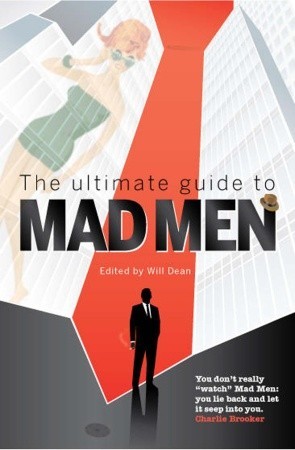Many books have been written that ride the long and lucrative coattails of AMC’s “Mad Men”. And because so many of them are the kind of quick-turn, fast-buck affairs that would make Roger Sterling smile as he counted his profits, the ones that actually attempt to be more than fanzines are often lost in the crowd. These are books that strive to be relevant not simply to admirers of the show, but to those who believe that the Mad Men era holds some insights into why we are the way we are today.
That Natasha Vargas-Cooper’s Mad Men Unbuttoned belongs to that latter, smaller, more contemplative group, is apparent from the opening pages when she writes that
[“Mad Men” is] about the culture clash and contradictions that occurred during the twilight of the Eisenhower era, the great societal shake-up of the 1960s, and how that pressurized time in history formed modern America, its families, its consciousness, and its consumers.
The resulting book is therefore much more sophisticated than one might expect, and while it is not entirely successful, if it falls short of its promise it is because it has set the bar very high indeed.
Ms. Vargas-Cooper has divided Mad Men Unbuttoned into nine sections that cover the ads, the style, the sex, the arts and the culture of the early 1960s, creating something well short of an encyclopedia of the era but something much more compelling than a simple litany of its most obvious and popular elements. Names are dropped, to be sure, but they’re names that show, at times, depth and perceptivity. Or perhaps we’re just saying that because she name checks Stephen Fox’s “The Mirror Makers” in the advertising section, alongside more usual suspects like “Confessions of an Advertising Man” and “Ogilvy on Advertising”.
These illuminating entries on, as Ms. Vargas-Cooper writes “the subjects that had the greatest relevance to the show” are punctuated by periodic essays from experts on particular aspects of those subjects that Ms. Vargas has brought in to provide some perspective – from The Awl’s Alex Balk to Fuse’s Tim Siedell to architect Megan Lubaska and novelist Matt Gallaway – providing an interesting counterpoint to Ms. Vargas-Cooper’s voice and method.
That method is on particular display late in the book when she takes aim at one of the more memorable exchanges in the series, the one between Don Draper and the hipsters in his bohemian girlfriend’s apartment. “My God,” Don says to them, “Stop talking. Make something of yourself.” “Like you?” one of them replies, “You make the lie. You invent want. You’re for them… not us.” To which Don answers “Well, I hate to break it to you, but there is no big lie. There is no system. The universe is indifferent.”
Ms. Vargas-Cooper begins this entry by identifying some of the casual references earlier in the scene, then unpacks a bit of the shorthand of the conversation, illuminating what the argument is that the hipsters are making and why, and then dives deeper into the contradictions and nuances that make the exchange intriguing and particularly resonant. And as she does, she raises questions and touches briefly on interesting insights and observations, all in a style that is friendly, knowing and smart.
But then, just as this whole exploration begins to get particularly interesting, it’s over, leaving the insights and the questions to float helplessly into the ether, as if Ms. Vargas-Cooper’s typewriter ran out of paper.
And that’s why the book’s strength is also, unfortunately, it’s weakness. The brevity and accessibility of the entire enterprise mean that the book encourages readers to dip in at any point for some compelling writing about a compelling era and show. But it also means that they will often be left holding the bag just as the story starts getting good (this is particularly true in the essay on Khrushchev, Disney and Hilton).
No where is this more strongly felt than in the final entry about the quickie divorces available in Reno. The abrupt ending to this piece on abrupt endings fairly begs for elaboration, and while we are not asking for everything to be tied up neatly with a bow, one does feel that because the entries and essays themselves often lack an arc, and because Ms. Vargas-Cooper has set such a high expectation in both the introduction and in the tenor and tone of the pieces themselves, something more is required. Attention, as it were, must be paid.
Or as Frank O’Hara might ask, “What else is there?”
Mad Men Unbuttoned: A Romp Through 1960s America by Natasha Vargas-Cooper was published by Harper Design on 07/20/10 – order it from Amazon here or from Barnes & Noble here – or pick it up at your local bookseller (find one here).
Please be advised that The Agency Review is an Amazon Associate and as such earns a commission from qualifying purchases
You May Also Want to Read:

to Mad Men
by Will Dean

by Stephen Fox

by David Ogilvy

